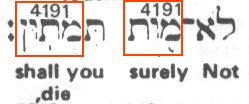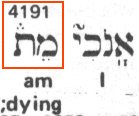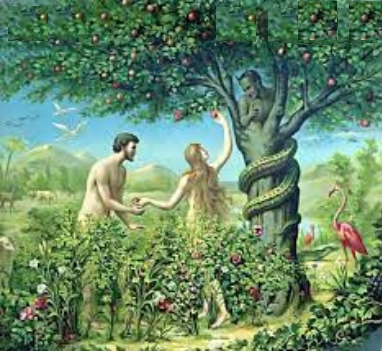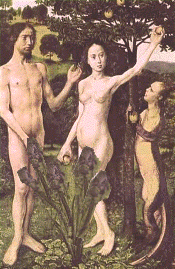There are some significant differences in the Hebrew words that have been translated as "die" and "surely die" in the recording of the communications of the Lord, Adam, Eve, and the serpent. The quote from the Scriptures that follow are Word by Word translations from the "Interlinear Bible" by J. P. Green and following each passage there is a magnified selection from the "Interlinear Bible" which is included to show in detail the recorded Hebrew words that are translated as die in each Passage. (Remember that Hebrew is read from right to left.)
but of the tree of the knowledge of good and evil
not you shall eat from it;
in the day of your eating from it
surely you shall die". (Genesis 2:16-17)

Notice that the Hebrew word ( Strong's # 4191 ) is repeated which is a technique often used in the Hebrew for emphasis and the last of the passage is often translated more literally as "dying thou shall die". A less literal translation is "for as soon as you eat of it, you shall be doomed to die". The GOD's WORD (1995) translates the Hebrew couplet H4191 H4191 as doomed to die in Genesis 20:7, but not in Genesis 2:17 where it uses certainly die and in 4 other verses. The GW uses must be put to death 37 times for the same Hebrew wording. (H4191 H4191 appears a total of 53 times in the Hebrew text.)
We know from reading the rest of the story the penalty was not sudden physical death, but as soon as the disobedience occurred Adam and Eve's relationship with the Lord was drastically changed and they were reduced to hiding in the bushes, the penalties were soon announced, and they were banished from the garden to continue the rest of their life in toil and sorrows.
"And said the woman to the serpent.
Of the fruit of the trees of the garden we may eat,
but the fruit of the tree in the middle of the garden had said God,
not shall you eat of it, nor shall you touch it,
lest you die." (Genesis 3:2-3)

Notice that Eve did not repeat the form of the Words of the Lord! Instead she varied the Hebrew word translated as die and did not use the repeated word form used for emphasis. She also added the phrase about not touching it. The word form she used is unusual and similar forms appear only in Numbers 16:29 and Isaiah 22:14 and in both of these occurrences it appears to mean a physical death under conditions of judgment. It would appear that in her statement she was possibly showing her uncertainty or lack of full understanding as to exactly when and what would be the result of disobedience and the seriousness of the penalty. Eve would seem to have no way of knowing about death unless she had witnessed the physical death of a plant or an animal.
"And said the serpent to the woman,
Not surely you shall die." (Genesis 3:4)

The reply of the serpent is phrased negatively and returns to the repeated word form but uses the same word form as the Lord for the first word and the word of Eve for the second word. This repeated word form is unique and appears no where else in the Scriptures. Therefore, the reply seems to be directed to how Eve had phrased her answer and to be correcting her statement or adding special emphasis in a negative way. There surely must be meanings within these Hebrew word changes that are not fully revealed by the translations. The BDB definition for H4191 includes "1a4) to die prematurely (by neglect of wise moral conduct)" Looking in Strong's "Dictionary of the Words in the Hebrew Bible" we find the following.

Note that there is also the possible meaning, especially for the repeated word form,
of a very sudden death. None of the translators have included the possibility
that there is a sudden time implication in the words. Looking in "The Word" by
Isaac E. Mozeson we see the following.


It would appear that Eve is either being corrected or gaining new information concerning the result of disobedience. Possibly the recorded serpent's reply could be more literally word for word translated as:
This would be contrary to what many have concluded, in that they have proposed that the serpent was contradicting the Lord. Instead it is proposed that the serpent as "wise" or "subtle" was communing in truth, that is partial truths. The apparent confusion on Eve's part causes us to wonder if she fully understood all of the terrible consequences of disobedience.
It would appear that Eve by using the short form of to die, with the added vowel connected n consonant, was saying that she believed that if she touched the fruit of the tree of knowledge she at that moment would die. While the Lord was using a softer form of to die which did not necessarily indicate a sudden death. The serpent was then possibly informing her that the tree of knowledge was not about death, but as its name implied was about knowledge only. No information was given to explain how severely the act of disobedience would be punished. Eve then saw that the fruit was pleasant to the eye and some how even saw that it was good to eat. How she saw that it was good to eat is not explained. And many translations indicate that Eve thought she would become "wise", to gain or show discernment or insight ?? Except for the English Septuagint by Brenton which says "beautiful (or tempting - NEB) to contemplate" and the DRB which says "fair to the eyes, and delightful to behold". Could it possibly be that she witnessed the fruit being eaten, and even being eaten by the serpent?? And did she consider the serpent to be "wise"?? Needless to say the true translation is a little uncertain! However, she by her own statement was aware of the prohibition to not eat of the tree and that it was from God!!
like to show the serpent in the actual tree!

and gave also unto her husband with her; and he did eat.
CONCLUSION: An alternate translation of the communication between the serpent and Eve
is proposed which is believed to be more in line with the Masoretic Text and as
suggested by Strong's dictionary. The new translation changes the serpent's answer
to Eve from a direct contradiction to the Words of the Lord to that of informing
Eve that the result of her disobedience will not be sudden physical death. A
less literal variation of the translation could be


